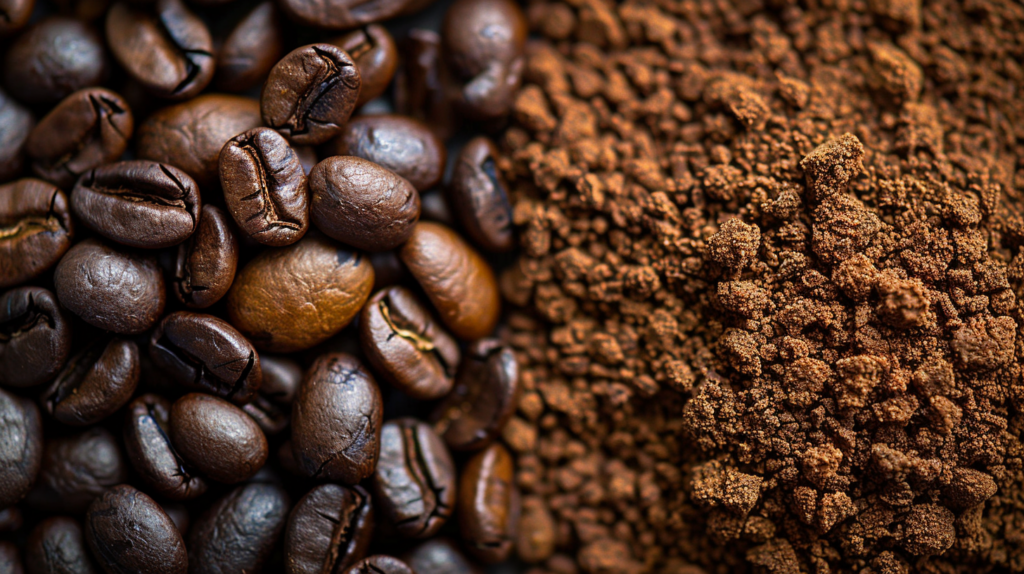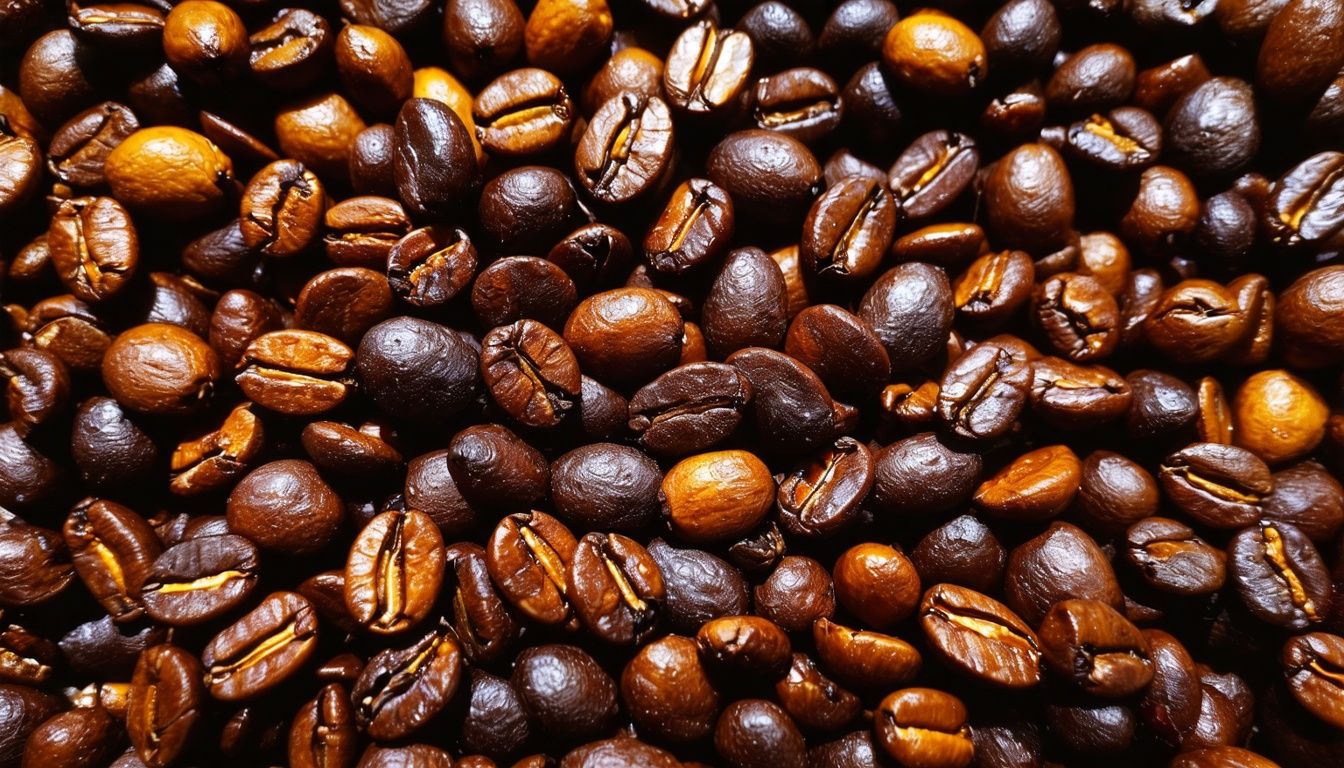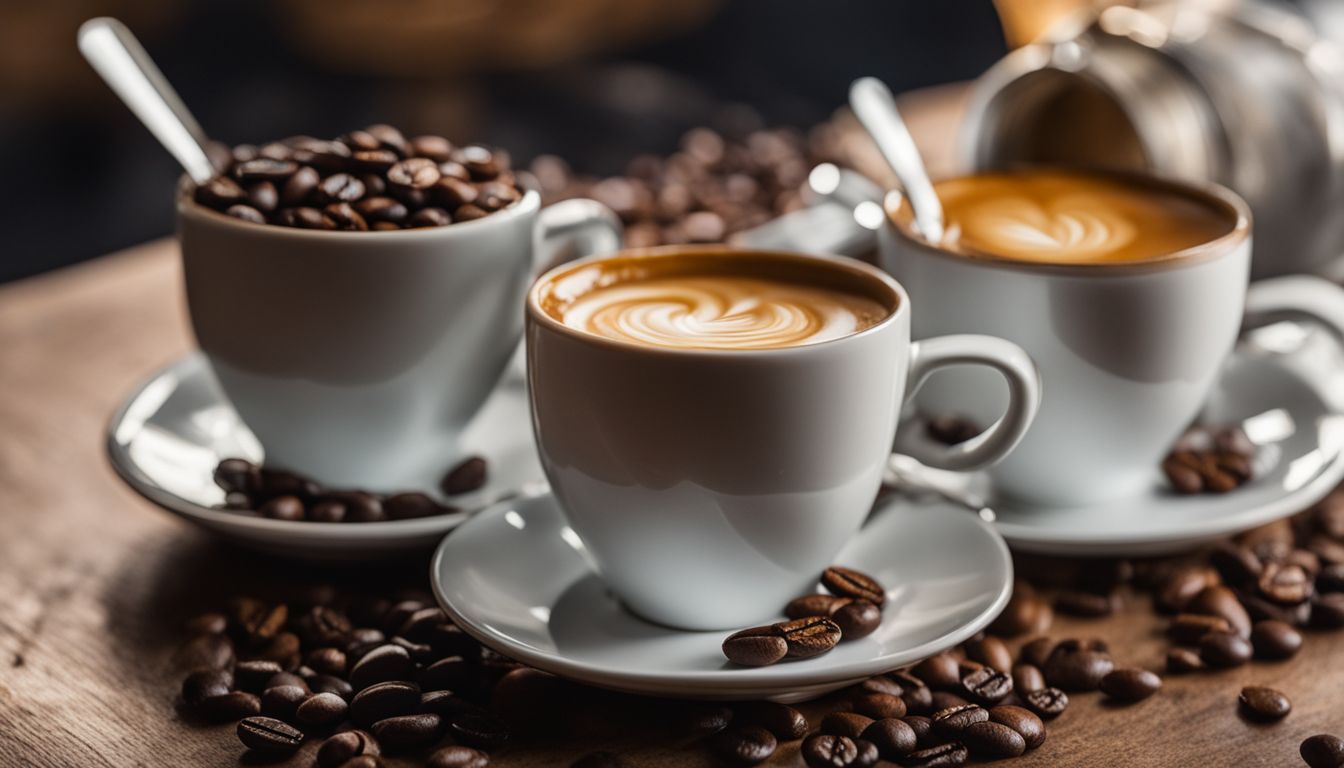Blog, Spill The Beans
Whole Bean Coffee vs Ground Coffee
When you choose between whole bean and ground coffee, you’re selecting more than just a form of coffee; you’re choosing an experience.
Whole bean coffee preserves its flavours and aromas well, as it stays intact until the moment of brewing. By grinding the beans yourself, you guarantee a fresh cup bursting with the beans’ inherent characteristics.
On the other hand, ground coffee offers convenience and speed, as it’s ready to brew instantly without the extra step.
Whole bean coffee demands a grinder and a bit more time, but it’s a worthy trade for the freshness advantage. It’s well known that coffee begins to lose its vitality swiftly after grinding; the exposure to air initiates the oxidation process.
This results in a more vibrant and intricate cup of coffee, which many believe to be well worth the effort.
Ground coffee, however, presents an accessible option for those seeking a quick and effortless cup, though it may sacrifice some nuances of taste.
Whole bean coffee also lasts longer than ground coffee when stored properly. Kept in a cool, dry place, they can remain at peak quality for around a month, reducing waste and ensuring you can enjoy a superior cup for weeks.
Ground coffee can also be stored for a good while, though its peak period is undeniably shorter. This means you may need to consume it more quickly to enjoy the best flavours it has to offer.
Understanding Coffee Basics
When you select your morning coffee, understanding the core differences between whole bean coffee and ground coffee is fundamental. This knowledge directly affects the freshness and flavour of your brew.
Bean Coffee and Its Significance
Whole bean coffee stores its complex taste and aroma within a protective shell. Essentially, the bean acts as a barrier against oxygen and moisture, which can degrade coffee quality over time.
For coffee lovers in a coffee shop, the sight of freshly ground coffee often assures them of its quality. Grinding beans just before brewing means unlocking the full potential of the coffee’s flavour profile.
The Importance of Freshness in Coffee
Fresh coffee is paramount for a great cup. The moment coffee beans are ground, they start to lose their freshness. Oxidation sets in, which dulls the rich flavours and aroma.
To a coffee shop, the freshness of their coffee becomes a defining trait of their business. Freshly ground coffee ensures a superior cup with vibrant, deep notes and a tantalising aroma.
| Factors | Bean Coffee | Ground Coffee |
|---|---|---|
| Freshness | Preserves freshness longer | Loses freshness quickly after grinding |
| Convenience | Requires grinding before use | Ready to brew |
| Flavour | More flavourful and aromatic | Flavour degrades over time |
| Storage Life | Can last fresh up to a month | Best used shortly after purchase |
Types of Coffee Grinds
Selecting the proper grind for your coffee is crucial for the perfect cup. The size of the grind affects the flavour and brewing time.
From Coarse to Fine: The Spectrum of Grounds
Coarse grinds resemble sea salt and are ideal for French press and cold brew. A medium grind is similar to sand and suitable for drip brewers and aeropress.
Fine grinds are like table salt, perfect for espresso machines. The finer the grind, the more surface area, which leads to a faster and more extensive extraction of flavour.
- Coarse: Chunky, distinct particles, like sea salt.
- Medium: More granular, like beach sand.
- Fine: A smoother texture, much like salt or sugar.
Speciality Coffee Grinds
Speciality coffee grinds cater to unique brewing methods beyond the common choices. For Turkish coffee, you desire an extra-fine grind, finer than flour.
The extra-fine grind allows for a creamy consistency and strong flavour.
Each specialty method may require a specific grind size for the optimum taste, dictated by the extraction time and technique.
Comparing Brewing Methods
You need to understand different brewing techniques to appreciate the nuances of whole bean and ground coffee. Each method affects the taste and quality of your brewed coffee distinctly.
Espresso vs Drip Coffee
Espresso machines force hot water through finely-ground coffee, resulting in a concentrated beverage. This method requires a fine grind size and typically uses more coffee per serving, which creates the intense flavour and crema that espresso is known for.
In contrast, drip coffee involves hot water filtering through ground coffee more gradually. A medium grind works best here.
The coffee absorbs the water and then drips into the pot or cup below, producing a lighter beverage usually enjoyed in larger quantities.
| Brew Method | Grind Size | Flavour Intensity | Typical Serving Size | Brew Duration |
|---|---|---|---|---|
| Espresso | Fine | High | Small (30ml) | 25-30 seconds |
| Drip Coffee | Medium | Medium to Mild | Large (240ml +) | 5-10 minutes |
Cold Brew and Other Techniques
Cold brew involves steeping coarse coffee grounds in cold water for an extended period, usually 12–24 hours.
The result is a smooth, sweet brew less acidic than hot brewed coffee. You enjoy cold brew at cold temperatures, which contrasts with traditional brewing methods that use hot water to extract flavour.
Other techniques like the French Press or Aeropress favour coarser grinds similar to the cold brew, but they involve immersion in hot water, creating diverse taste profiles.
Impact of Grinding on Flavour
Grinding coffee beans is a critical step that directly influences the flavour of your coffee. The degree to which you grind the beans and whether you choose to grind at home or use pre-ground coffee can greatly affect the final taste.
Grinding at Home vs Pre-Ground
Grinding at home means you crush the coffee beans just before brewing. This process enhances the flavour and aroma of your coffee because it minimizes the time between grinding and brewing, ensuring the coffee’s essential oils and flavours stay intact.
For the best results in grinding at home, many suggest using a burr grinder. This device gives a consistent grind size—essential for flavour extraction.
On the other hand, pre-ground coffee isn’t as flavourful. As soon as coffee is ground, it starts to oxidize and lose its complexity.
Pre-ground coffee often exhibits a duller taste compared to freshly ground beans because it sits on shelves and encounters air exposure, which degrades its taste.
To maintain coffee taste, it’s imperative to store ground coffee in a sealed container to minimize further flavour loss.
Convenience and Shelf Life
When choosing between whole bean and ground coffee, you’ll find that both convenience and how long your coffee stays fresh are important factors to consider.
Instant Coffee: Pros and Cons
Instant coffee offers the height of convenience: just add hot water, stir, and your coffee is ready. However, you trade off some flavour and aroma for this ease of use.
Instant coffee typically has a longer shelf life but may not satisfy you if you prefer the fresh taste and robust smell of newly ground beans.
Storing Your Coffee
To maximise the freshness of your coffee, storage plays a crucial role.
Whole beans stay fresher for longer, as they have a reduced surface area exposed to air compared to ground coffee. A coffee bag with a one-way valve is ideal for keeping beans fresh.
For ground coffee, use it quickly to enjoy the best flavour, as it can become stale faster. Consider a coffee subscription service if you prefer fresh ground coffee regularly without the hassle of storing large amounts.
Frequently Asked Questions
When selecting your coffee, you often face a choice: whole bean or ground. Each offers a different experience in taste, cost, freshness, health benefits, and preparation techniques.
What distinguishes the taste of whole bean coffee from ground coffee?
Whole bean coffee generally provides a superior flavour compared to ground coffee due to the preservation of its oils and aromas. When you grind coffee right before brewing, you capture the full spectrum of the bean’s flavour, offering a more robust and nuanced cup.
In terms of cost efficiency, should one opt for whole beans or pre-ground coffee?
Whole beans typically offer better value for your money. They may come with a higher upfront cost, but their extended shelf life and richer flavour mean you can enjoy high-quality coffee for longer.
This reduces waste and saves money in the long run.
How do the health benefits of consuming whole bean coffee compare to those of pre-ground coffee?
Whole bean coffee maintains more of its natural antioxidants because it is less exposed to oxygen, which can lead to oxidation. Freshly ground beans ensure you receive a hearty dose of compounds beneficial to your health with every cup.
Is there a notable difference in freshness between whole bean and ground coffee?
Freshness is a key differentiator: whole bean coffee stays fresh longer. Meanwhile, grinding increases the surface area exposed to the elements and can lead to faster loss of flavour and aroma over time.
What are the proper techniques for using whole bean coffee compared to pre-ground?
Using whole bean coffee requires a grinder and an extra step in your preparation process. You control the grind size—coarse, medium, or fine—depending on your brewing method. Pre-ground coffee offers convenience, being ready to use straight from the package.
Does the shelf life of whole bean coffee differ significantly from that of ground coffee?
Whole bean coffee has a longer shelf life. Sealed whole beans can stay fresh for about six to nine months past their roasting date. Meanwhile, ground coffee can last three to five months past the date on the package if it remains unopened.



